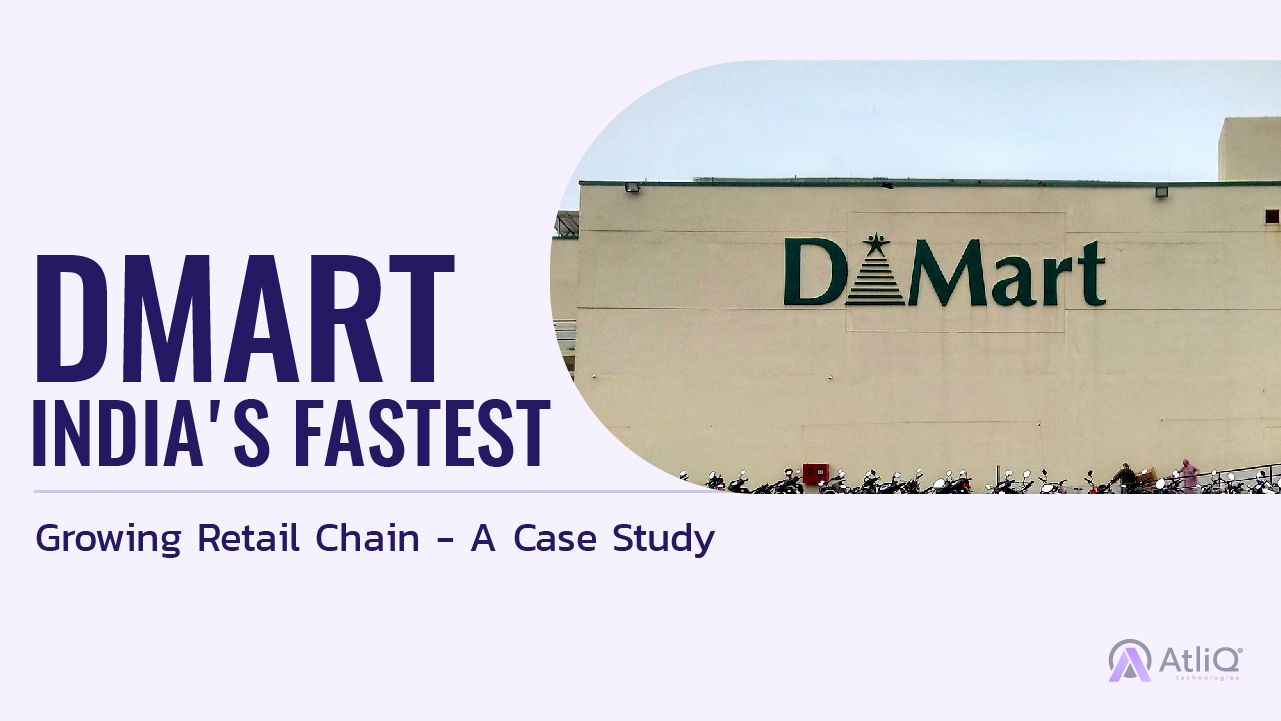
Forget gold, the real rush in India is for groceries!
DMart, the nation’s fastest-growing retail chain, is rewriting the rules of the game. With its unique blend of everyday low prices, efficient operations, and a focus on customer satisfaction, DMart is shaking up the landscape and leaving its competitors in the dust. Buckle up, as we unveil the secrets behind DMart’s meteoric rise and explore how this retail giant is redefining the shopping experience for millions of Indians.
Imagine a supermarket overflowing with everyday essentials – groceries, clothing, homeware – all offered at unbelievably competitive prices. Founded in 2002, DMart has taken the nation by storm, establishing itself as a go-to destination for bargain hunters and value-conscious shoppers alike. DMart’s phenomenal growth trajectory is nothing short of impressive. While established retail giants grapple with complex strategies, DMart has carved its niche through a laser focus on affordability and efficiency. With over 340 stores spread across 14 states, DMart’s footprint is rapidly expanding, offering a one-stop shopping experience for millions of Indian families.
But what exactly fuels DMart’s remarkable success? Buckle up, because we’re about to delve deeper into the secrets behind this retail powerhouse.
The DMart Journey
DMart’s story isn’t one of overnight success, but rather a testament to calculated moves and unwavering commitment to its core values. Let’s take a walk down memory lane and explore the key milestones that shaped DMart into the retail giant it is today:
2002: The year it all began. The first DMart store opened its doors in Powai, Mumbai, laying the foundation for the future retail empire.
Early Years (2002-2010): Focused on understanding the Indian market dynamics, DMart adopted a cautious approach, opening only 25 stores in this period. However, this phase was crucial for refining their unique business model and building a loyal customer base.
Expansion and Growth (2010-Present): With a clear vision and a successful model in place, DMart embarked on an aggressive expansion plan. From 25 stores in 2010, it has grown to a staggering 340+ stores across 14 states in India as of March 2024. This translates to an average of 34 new stores opening every year in the past decade!

DMart’s journey is a perfect illustration of calculated growth, strategic planning, and a deep understanding of the Indian consumer. As it continues to expand its reach, one thing remains certain: DMart’s impact on the Indian retail landscape is undeniable, and its story is far from over.
DMart’s Business Model
DMart’s success story isn’t just about low prices; it’s about a meticulously crafted business model that prioritizes efficiency, value, and customer satisfaction. Let’s dissect the key pillars that have propelled DMart to the forefront of the Indian retail industry:
- Everyday Low Prices (EDLP): Unlike competitors who rely on heavy promotions and discounts, DMart champions the “EDLP” strategy. This means consistently offering competitive prices on a wide range of products, eliminating the need for customers to wait for sales or special offers. This approach fosters trust and loyalty, as customers know they can rely on DMart for consistent value, every day.
- Efficiency is Key: DMart operates with a laser focus on cost control and operational efficiency. They achieve this through:
-
- Bulk Procurement: DMart negotiates directly with manufacturers and suppliers for bulk purchases, securing significant discounts that translate into lower prices for consumers.
- Limited Product Variety: Instead of carrying every brand and variant, DMart offers a curated selection of essential products, minimizing storage and shelf space requirements.
- Simple Store Layout: DMart stores prioritize functionality over fancy displays, reducing operational costs and allowing them to pass on savings to customers.
- The Power of “DMart Ready”: DMart’s private label brand, “DMart Ready,” plays a crucial role in its EDLP strategy. These products, spanning across various categories like groceries and household items, are manufactured to meet specific quality standards while maintaining competitive pricing. This allows DMart to offer high-quality alternatives to established brands, further enhancing their value proposition for customers.
DMart’s EDLP strategy, coupled with its focus on operational efficiency and the strategic use of its private label brand, creates a win-win situation for both the company and its customers. DMart benefits from increased profit margins due to cost control and bulk buying, while customers enjoy consistently low prices on quality products, fostering long-term brand loyalty.
This unique business model has not only disrupted the Indian retail landscape but also served as a blueprint for success for other businesses seeking to thrive in a competitive environment.

DMart’s Marketing Magic
In a world bombarded with flashy advertising and aggressive marketing campaigns, DMart stands out by taking a minimalist and customer-centric approach. Here’s how they break the mold:
- Letting the Products Do the Talking: DMart stores are a testament to the power of simplicity. They forego elaborate in-store branding and flashy displays, focusing instead on a clean layout and well-organized product selection. This allows customers to navigate the store with ease and find what they need quickly, creating a stress-free shopping experience.
- Strategic Use of Promotions: While DMart champions EDLP, they understand the power of occasional targeted promotions. They strategically implement:
-
- Festival Offers: During major Indian festivals like Diwali and Holi, DMart offers temporary discounts on specific categories like sweets, dry fruits, and other festive essentials. This attracts customers looking for specific items during the festive season and reinforces DMart’s image as a value-conscious brand.
- Bulk Purchase Discounts: DMart incentivizes customers to buy in bulk by offering additional discounts on large quantities. This not only increases their sales volume but also encourages customers to stock up on essentials, promoting repeat visits and loyalty.
- Building Trust, One Interaction at a Time: DMart understands that true marketing goes beyond promotions. They prioritize building trust and loyalty through:
-
- Customer Service: DMart invests in training their employees to be helpful and courteous, ensuring a positive shopping experience for every customer.
- Transparency in Pricing: Unlike some competitors who may advertise heavily discounted items with hidden costs like mandatory add-ons, DMart prioritizes transparent pricing. This builds trust with customers who appreciate knowing exactly what they are paying for.
- Quality Assurance: DMart maintains strict quality control measures for both national and private label brands, ensuring customers receive products they can trust.
DMart’s marketing strategy, though seemingly unconventional, is remarkably effective. By focusing on product selection, strategic promotions, and building trust through customer service and transparency, they have carved a unique niche in the Indian retail landscape. This approach resonates with value-conscious shoppers who appreciate a no-frills, trustworthy shopping experience. This, in turn, fosters brand loyalty and fuels DMart’s continued growth.
DMart: A Legacy in the Making – Impact, Future, and Beyond
DMart’s journey isn’t just about its success; it has significantly impacted the Indian retail landscape. Here’s how:
- Championing Value: DMart’s EDLP strategy has forced competitors to re-evaluate their pricing models, leading to a more price-conscious environment for Indian consumers.
- Redefining Efficiency: DMart’s focus on operational efficiency has set a new standard for other retailers, encouraging them to streamline operations and minimize costs.
- Empowering Consumers: By offering quality products at affordable prices, DMart has empowered Indian consumers, particularly those in the budget-conscious segment, to make informed purchasing decisions.

Looking Ahead: Challenges and Opportunities
Despite its remarkable success, DMart faces challenges in the future:
- Competition: The Indian retail sector is fiercely competitive, with established players like Reliance Retail and the emergence of e-commerce giants like Amazon and Flipkart posing significant challenges.
- Maintaining Growth Momentum: Sustaining the current growth rate might become difficult as DMart expands into new markets with different consumer preferences and competitive dynamics.
- Evolving Consumer Landscape: DMart needs to adapt to the evolving needs and expectations of Indian consumers, who are increasingly tech-savvy and seek a more seamless omnichannel shopping experience.
However, amidst these challenges, lie exciting opportunities:
- E-commerce Expansion: DMart’s recent foray into e-commerce holds immense potential to tap into a growing online market and cater to a wider customer base.
- Tier-2 and Tier-3 Cities: Expanding into smaller cities and towns in India presents a vast untapped market with significant growth potential.
- Product Diversification: DMart can explore strategically diversifying its product portfolio to cater to a broader range of customer needs and preferences.
Conclusion: A Story Still Unfolding
DMart’s story is a testament to the power of a clear vision, unwavering commitment to value, and a deep understanding of the customer. From its humble beginnings to its current position as a retail powerhouse, DMart has redefined the shopping experience for millions of Indians. As it navigates the challenges and opportunities that lie ahead, one thing remains certain: DMart’s impact on the Indian retail landscape is undeniable, and its story is far from over. The future holds immense potential for this retail giant, and it will be fascinating to see how it continues to evolve and shape the Indian retail landscape in the years to come.


